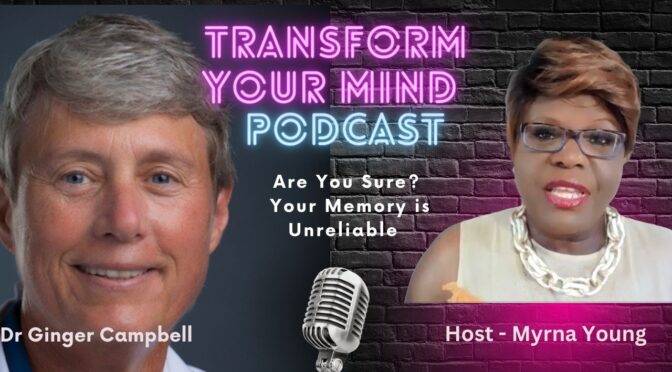Dr. Virginia “Ginger” Campbell, a physician, author, and science communicator, discusses the subconscious workings of the brain. In this episode she explains that up to 95% of the brain is subconscious, meaning that most of our brain processes are not accessible to our conscious awareness. Dr. Campbell emphasizes the importance of understanding the brain's subconscious origins of certainty and how memory is unreliable. She also highlights the role of the body in creating our experiences and how this knowledge can make us more tolerant. Dr. Campbell's goal is to make neuroscience accessible to all.
Download the podcast here:
Introduction
Welcome back to the Transform Your Mind to Transform Your Life radio podcast and television show. I'm your host, Life Coach Myrna Young, and today we have a special guest in the studio, Dr. Virginia Campbell, also known as Ginger. Dr. Campbell is an author, physician, and science communicator, specializing in neuroscience. We will be diving into the fascinating topic of the subconscious and intricate workings of the brain. Welcome, Dr. Campbell!
Dr. Campbell: Thank you, Myrna. I'm excited to be here.
Myrna: We are going to have a great conversation on neuroscience and the brain, a topic that I absolutely love. The brain controls everything in our body, and understanding how it works is crucial. Dr. Campbell, could you start by explaining what you mean when you say that 95% of the brain is unconscious?
Dr. Campbell: Certainly, Myrna. When I say that 95% of the brain is unconscious, I'm referring to the fact that most of the processes of the brain are not accessible to our conscious awareness. For example, we are not aware of how our brain processes vision. Even when we know that an illusion is not real, we still see it because the processing is happening at an subconscious level. This subconscious processing is essential for many of the sophisticated processes we associate with being human.
Myrna: That's fascinating. So, why does this matter in our everyday lives?
Sponsored Ad
This December, get Factor and enjoy eating well without the hassle. Simply choose your meals and enjoy fresh, flavor-packed meals delivered to your door. Ready in just 2 minutes, no prep, no mess!
Head to FACTORMEALS.com/transform50 and use code transform50 to get 50% off.

95% of the brain process is subconscious
Dr. Campbell: Well, let's take reading as an example. The first stage of learning how to read is decoding, which happens automatically and subconsciously. If we couldn't learn to decode automatically, reading would be a much more challenging task. The subconscious processing of the brain allows us to perform complex tasks without having to consciously think about every step. It's what makes us efficient and capable beings.
Myrna: That makes sense. So, it's like our brain is constantly working behind the scenes, allowing us to navigate the world without having to consciously process every little detail.
Dr. Campbell: Exactly. Our brain is constantly processing information and making decisions without us even realizing it. It's like having a personal assistant who takes care of all the background work, allowing us to focus on the things that require our conscious attention.
Myrna: That's incredible. Now, let's talk about memory. In your work, you mention that everyone's memory is unreliable. Can you explain what you mean by that?
Amazon: Paid Link
Amazon Fire TV 32″ 2-Series HD smart TV with Fire TV Alexa Voice Remote, stream live TV without cable (45% off)

Your memory is unreliable
Dr. Campbell: Certainly. Memory is not like a video camera that records and stores every detail of our experiences. Every time we recall a memory, our brain recreates it, and during this process, it can introduce new information or distort the original memory. This means that our memories are not always accurate representations of what actually happened. It's important to understand that memory is not a perfect record of our past, but rather a reconstruction influenced by various factors.
Myrna: That's mind-boggling. So, even though we remember something vividly, it doesn't necessarily mean that it happened exactly as we remember it?
Dr. Campbell: That's correct. Our memories can be influenced by our emotions, beliefs, and even external suggestions. It's not uncommon for two people to remember the same event differently. This is why it's crucial to approach memory with caution and not rely solely on our recollections when making judgments or accusations.
Myrna: That's a powerful insight. It reminds me of the saying, “There are three sides to every story: yours, mine, and the truth.” Our memories are subjective and can be influenced by various factors.
Dr. Campbell: Absolutely. It's essential to approach memory with humility and recognize that our recollections may not always be accurate. This understanding can lead to more tolerance and open-mindedness in our interactions with others.
Understanding the subconscious brain makes us more tolerant
Myrna: That brings me to my next question. You mentioned that understanding the brain makes us more tolerant. How does that connection work?
Dr. Campbell: The connection between understanding the brain and tolerance lies in the realization that certainty has subconscious origins. Our brain creates a feeling of certainty, even when we may be wrong. This feeling of certainty can lead to rigid beliefs and a lack of openness to other perspectives. However, when we understand that our certainty is not always based on objective truth, we can become more tolerant of differing opinions and be open to considering alternative viewpoints.
Myrna: That's a powerful insight. So, by recognizing that our certainty is not infallible, we can cultivate a sense of humility and empathy towards others who may hold different beliefs or perspectives.
Dr. Campbell: Exactly. It's about recognizing the limitations of our own certainty and being open to the possibility that we may be wrong. This can lead to more constructive conversations and a greater appreciation for the diversity of human experiences.

Are you sure?
Myrna: That's a valuable lesson for all of us. Now, let's talk about your book, “Are You Sure: The Unconscious Origins of Certainty.” What inspired you to write this book?
Dr. Campbell: My inspiration for writing this book came from the work of Robert Burton, whose research on certainty and the subconscious mind deeply resonated with me. I wanted to share these ideas with a broader audience and make neuroscience accessible to people from all backgrounds. The book explores the subconscious origins of certainty and delves into the fascinating world of the brain and how it shapes our experiences.
Myrna: That sounds fascinating. What do you hope readers will take away from your book?
Dr. Campbell: My ultimate goal is to expand people's understanding of the brain and its influence on our lives. I want readers to recognize the fallibility of memory, the power of unconscious processes, and the importance of tolerance and open-mindedness. By gaining a deeper understanding of the brain, we can navigate the complexities of life with more compassion and empathy.
Myrna: That's a powerful message. Thank you, Dr. Campbell, for sharing your insights and expertise with us today. It has been a pleasure having you on the show.
Dr. Campbell: Thank you, Myrna. It was my pleasure to be here.
Conclusion
In conclusion, our conversation with Dr. Virginia Campbell has shed light on the unconscious and intricate workings of the brain. We have learned that the majority of our brain's processes are subconscious, allowing us to perform complex tasks effortlessly. Memory, too, is not a perfect record of our past, but a reconstruction influenced by various factors. Understanding the fallibility of memory can lead to more tolerance and open-mindedness in our interactions with others.
Dr. Campbell's book, “Are You Sure: The Unconscious Origins of Certainty,” delves deeper into these topics, providing readers with a greater understanding of the brain and its impact on our lives. By embracing the complexities of the brain, we can cultivate empathy, compassion, and a deeper appreciation for the diversity of human experiences. The journey of understanding our brain is ongoing, and it holds the potential to transform our lives and the world around us.

